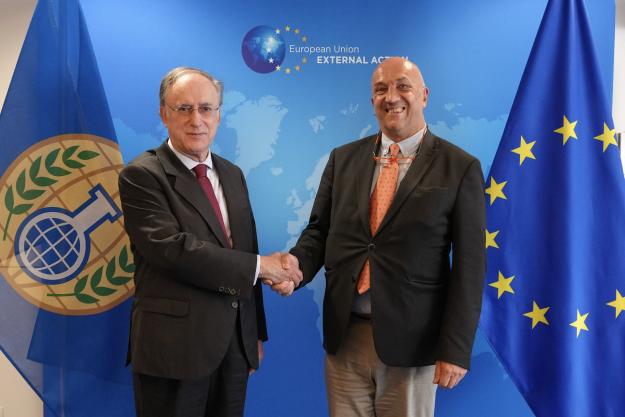THE HAGUE, Netherlands—20 November 2024—The Director-General of the Organisation for the Prohibition of Chemical Weapons (OPCW), Ambassador Fernando Arias, and the European Union (EU) Special Envoy for Non-Proliferation and Disarmament, H.E. Mr Stephan Klement presided over the 2nd OPCW-EU High-level Consultation in Brussels on 11 November 2024.
During the consultation, the two sides exchanged views on challenges related to the implementation of the Chemical Weapons Convention (CWC) against the backdrop of the downgraded international security situation. Both sides highlighted the importance of upholding the global norm against chemical weapons through effective global cooperation and universal implementation of the CWC.
The Director-General highlighted the importance of the OPCW-EU partnership and expressed his deep appreciation for EU’s substantial political and financial support to the OPCW. He stated “the EU is the largest provider of voluntary contributions to the OPCW, and one of the most active cooperation partners in advancing the objective of a world free of chemical weapons. Programmes and projects of the OPCW in many fields, such as international cooperation and assistance and protection, verification missions, engagement with civil society, and more were made possible thanks to the EU’s continuous support. The OPCW will continue to work closely with the EU for the full implementation of the CWC.”
Director-General Arias provided an overview on the OPCW’s recent efforts in preventing re-emergence of chemical weapons. He said that the OPCW has been proactively addressing the risks and opportunities arising from rapid advances in science and technology, especially artificial intelligence (AI). Among others, he underlined that “the first-ever Global Conference on the Role of AI in Advancing the Implementation of the CWC, held in Morocco last month, has provided valuable guidance to ensure that AI supports the OPCW’s mission to prevent the re-emergence.”

Fernando Arias, Director-General of the OPCW, and H.E. Mr Stephan Klement, European Union (EU) Special Envoy for Non-Proliferation and Disarmament
The two sides had discussions on key issues of common concern. The Director-General provided an update on the OPCW’s mission to eliminate the Syrian chemical weapons programme, including the work of its Declaration Assessment Team (DAT), Fact-Finding Mission (FFM), and Investigation and Identification Team (IIT). He also briefed the Special Envoy of EU on the assistance and protection support that the OPCW has been providing to Ukraine under Article X of the Convention, upon the latter’s request. He then touched upon the opportunity for engaging States not party to promote universality of the CWC, expecting to welcome South Sudan as the 194th State Party in the near future. In addition, both sides discussed the outlook and preparations for the upcoming 29th Conference of States Parties (the CSP) that will be held from 25 to 29 November 2024.
Special Envoy Klement stated that, “It’s a pleasure working with Director-General Arias to advance our common goal of preventing the re-emergence of chemical weapons. The EU stands firmly behind the OPCW for the full implementation of the Chemical Weapons Conventions, and its universalisation. We’re eager to further deepen collaboration and find synergies between the OPCW and the EU’s work in CBRN security.”
Background
In 2003, the EU adopted its Strategy against the Proliferation of Weapons of Mass Destruction. The strategy is designed to prevent, deter, halt and, where possible, eliminate weapons of mass destruction programmes worldwide. Since 2004, the OPCW has received a total of EUR 48.5 million in the form of voluntary contributions from the EU Institutions.
As the implementing body for the Chemical Weapons Convention, the OPCW, with its 193 Member States, oversees the global endeavour to permanently eliminate chemical weapons. Since the Convention’s entry into force in 1997, it is the most successful disarmament treaty eliminating an entire class of weapons of mass destruction.
In 2023, the OPCW verified that all chemical weapons stockpiles declared by the 193 States Parties to the Chemical Weapons Convention since 1997 — totalling 72,304 metric tonnes of chemical agents — have been irreversibly destroyed under the OPCW’s strict verification regime.
For its extensive efforts in eliminating chemical weapons, the OPCW received the 2013 Nobel Peace Prize.
